As I was browsing through movies on Netflix, I came across a Holocaust film I hadn’t heard about. I began watching it and the unexpected soundtrack riveted my attention—why, I wondered, did a Holocaust film set in Hungary feature Ladino music? Googling the film, I discovered that the director was Jasmin (Yas-meen) Dizdar. I’d never heard of him. As a Jewish historian of the Ottoman Empire and the modern Middle East, I was intrigued. The name “Dizdar” was familiar to me from my studies of the Islamic history of Jerusalem. It originates from Persian, meaning “commander of a fortress or castle.” The Ottoman Turks adopted the term to mean an officer in charge of a city, with it eventually becoming the word for “mayor.” I knew that Bosnia had a rich tradition of warm Muslim-Jewish relations: Why did this Bosnian Muslim direct a Holocaust movie?
So what does one do these days? Of course I looked him up on Facebook. Soon, I was chatting with him on Messenger. Our isolation during the height of COVID melted away as we talked about why he made The Chosen.
At a towering 6’5”, I learned that the director has always stood out. His warmth, humor, and easy-going generosity are reflected in his earlier film, Beautiful People (1999), about Bosnian refugees in London and their comical—and poignant—experiences with English people “who were also going through their own ‘wars and conflicts in their lives.’” Even now, after many years in the UK, Jasmin is still perceived as an outsider and considers himself a nomad. He is not well known in the US, though he told me “one of the greatest film critics in the US, the late Roger Ebert, selected [Beautiful People] as one of his ‘1000 best movies of all time.’”
Dizdar’s successful treatment of war in Beautiful People was the genesis of Chosen. One day, his friend, producer Michael Riley, brought him the script for The Chosen, written by Gabriel de Mercur, a Jewish historian, which he said was based upon a true story. Beautiful People had included a brutal war scene, and Michael believed Jasmin could do a war film; it would be the first time the two would work together.
The script initially appealed to Jasmin because it was set in the Balkans, Jasmin’s homeland. He was excited to film in Romania, where he’d never worked. Most of all, the script appealed to him because it tells the story of what Jasmin describes as “the perfect couple—pure and simple—whose tragedy illuminated the collapse of justice.” This young married couple, law-abiding citizens, is caught up in the intensifying crisis as the Nazis are about to descend upon Hungary in 1944. Betrayed by their best friend, their life together is tragically cut short.
Yet Jasmin hesitated. He mostly had made comedies about social issues, and this script was “very dark, very brutal.” He didn’t think it was a project for him. But then he re-read the script. “It was really strange; it suddenly hit me, triggering my subconscious, something from my past,” he explained.
In film school Jasmin had seen “lots of war movies.” The Russian World War II film Come and See (1985) was the first that made him want to make one, “deep down.” He explained that there were “three WWII movies on Jewish themes” which are now film classics “close to my heart: The Shop On Main Street (1966) by Elmar Klos and Jan Kadar; The Pawnbroker (1964) by Sidney Lumet, and The Passenger (1963) by Andrej Munk.” As a young student he’d often thought to himself—”when I’m famous I’ll make a WWII movie too—it would be the icing on the cake.”
When he lived in Prague through the momentous events of the Velvet Revolution that led to the break up of Czechoslovakia, he recalled “seeing how the paranoia created by the police state,” led “everyone to report on everyone else” to prove their loyalty to the Communist regime. He learned about how liars and tricksters operated, how “betrayal had become a ‘creepy’ kind of heroism in the twisted politics” of the Soviet bloc. This led him to make his award-winning student film, After Silence in 1987 about a deaf man, who after twenty years of “silence” suddenly can hear again. This film was followed by what Jasmin calls a “daring” social satire, his senior project, ironically entitled Our Sweet Homeland, about a group of passengers who declare their compartment independent of the rest of the train. This prophetic film was shot in Spring, 1988, one and a half years before the fall of the Soviet Union and the disintegration of the Soviet bloc, and three years before the Yugoslavian republics began declaring their own independence.
As Yasmin thought about making Chosen, he realized that because the story was set in the Balkans, in Hungary and Poland, and was to be shot in Romania, next door to his former homeland, he would have the unique opportunity of working with people whose “mentality and culture”—and history— he shares. The story was especially horrific for him—and so he decided to make the film.
As Jasmin studied the script, he began to envision the film as a love story, an intimate portrayal of a young couple, Florence and Sonson, deeply in love and expecting a baby in war-torn Hungary. Florence is depicted as a modern and pious woman, who lights Shabbat candles and reads the bible at night before going to bed. Their Jewish home is the warm heart of the film, encapsulating warmth and family and promise. Then, in 1944, just as the Nazis in Russia were reported to be “on the ropes,” their perfect little family, their entire world, collapses.
Jasmin focused on the character of Sonson, “an interesting contradiction, a man of God, a man of honor, and a man of word who stood against brutality and violence just to be forced by brutal circumstances to change, becoming a legendary fighter himself.” At the beginning of the film Sonson, a barrister, has been stripped of all human dignity and reduced to working in a quarry. Having lost everything but a promise, his hero had decided to become a “kamikaze”—“taking the whole world on, which is an aspect of Sonson’s Balkan mentality.” When I asked Jasmin to explain what he means when he said this, he explained it in this way: “when I watch Balkan athletes, like tennis player Novak Djokovic fight with his Balkan inner demons on that tennis court, I see someone who is not only taking his opponent on, he is taking the whole world on, just like Sonson in the movie. So it was not difficult for me to engineer and navigate that sort of innermost toil.” Jasmin recognizes that Jewish people share this “Balkan” mentality”—and in this connection he tapped into the Jewish dimension of Balkan culture to create the haunting atmosphere of the movie.
The story of Sonson is one of heroism born of love, not politics. When he is told he must fight “for his people” he is unmoved, but once the promise has been made, “he will fight until the last drop of his blood.”
Jasmin decided to focus the story on the lengths one will go to keep a promise made to a loved one. Sonson’s transformation from barrister to partisan commander is told in three acts: a romance, a personal odyssey, and a thriller. He reshaped the script into an epic: a ballad, a lament. The first act is set in the home of Sonson and Florence, the second in an unnamed Hungarian city deranged by betrayal and violence, and the third in Krakow, Poland, where desperate partisans fight it out with retreating Nazis as the Soviet army closes in. The three acts are bound together through the eyes of the narrator and the story of his wife’s younger sister Judith, an anti-fascist Jewish partisan. The movement of the film is threaded together by a promise Sonson makes to his wife on her deathbed, a promise which has to be kept to give Sonson a reason to live and to fight. Judith becomes Sonson’s only living link to his dead wife and child; in a dramatic triangle, the two sisters: one dead and one still, possibly, or impossibly, alive, and Sonson’s pledge to find her, dead or alive, that enabled Jasmin to keep “the momentum clock ticking,” creating the suspense that carries the thriller.
In uncomfortably realistic scenes depicting the brutality of Hungarian fascists eager to collaborate with the Nazi goal of exterminating Hungary’s Jews, the film depicts the arrest, rape, and forced transportation of Judith on a train bound for an unnamed concentration camp–Auschwitz.
Jasmin wanted to infuse the film with what he called “the Balkan Blues”— Sevdah—a soulful and playful mix of Slavic, Jewish, and Turkish music. He met with Philip Sheppard, the composer, to discuss what he wanted for the score. Jasmin is a big fan of Ladino culture and music, and is inspired by Sephardic history, a story of tragedy, displacement, and longing. He insisted that the score had to include this layer of Balkan culture. Catching on, Phillip put on a recording of Haim Effendi, the most famous Ladino singer in the world, who was born in 1853 in Turkey. “He was a good networker” Jasmin said of Haim, who was one of the earliest artists to use the new audio-technology. “He knew the early pioneers of sound recording and he persuaded them to record his music. They positioned their huge microphone in front of him and recorded him singing the song ‘A la Una Naci Yo’ on a street in Istanbul in 1907.” In a critical scene, Sonson brings out a gramophone and plays this song for his wife, recreating their lost world. It, and another song, written by Philip, entitled “Lamento,” elevate the film into a ballad and a lament.
Jasmin explained that “We used to have large Sephardic community in our capital Sarajevo in Bosnia, Sephardic Jews refugees who escaped from Spain in the sixteenth century and brought with them their beautiful culture and Ladino music. In Chosen I used the famous Ladino song ‘A La Una Nasi Yo’ played and sang by Haim Effendi and specially arranged for the film by my film composer Phillip Sheppard. Haim Effendi recorded this real-life recording on the street at the beginning of last century. He simply sat, played and sang it which is why the song has such beautiful raw documentary feel. Haim Effendi was totally forgotten. Chosen brought him and his music back to life 100 years after this song was originally recorded.”
I knew that there was a dark personal story behind Jasmin’s decision to make the film. As we began our second interview, I asked Jasmin about whether his faith affected the way that he told his story. Jasmin responded, “I am not religious but I am interested in history and religion as scholarly subjects. All my student films and my professional films have a clear spiritual subtext and message. I believe that the film has to work on many levels simultaneously and the spiritual level is one for me. It somehow…makes the film resonate deeper inside you.” I prodded him to talk to me about being a Muslim, but he deflected me.
Still, as we spoke, we kept moved closer and closer to Jasmin’s own story, “My grandparents (my dad’s parents) were killed by Nazis in WWII and my dad grew up as war orphan. I don’t really know much about them and since there is no grave or anything out there to remember them, I thought I’ll do that with this movie and Chosen was my little dedication….”
And so it is the tragedy of Jasmin’s Bosnian Muslim family that is the true inspiration for the making of Chosen, his “Holocaust film about the tragedy of European Jews.”
This history always mattered and will matter for him. He reprised the ugly twentieth century history of the Balkans for me in this way: “Croatia and Bosnia used to be (before WWI) part of Austro-Hungarian empire whilst Serbia was Austro-Hungarian’s enemy. Serb Gavrilo Princip assassinated Austrian Duke Franz Ferdinand in Sarajevo, which started WWI. So, in WWII ultra right-wing Bosnians and Croatians found it to be safer to associate themselves with the former rulers (Germans) whilst those on the left and others were communists and anti-Nazis. These divisions, remain until today as the so called “unfinished business”, between pro- and anti-Nazis in WWII and, was one of main reasons for the 1990s Bosnian civil war and the fall of Yugoslavia. He told me, “I want you to watch the Russian film Come and See which for me is the greatest WWII film ever. In it there is a scene of which also happened to my grandparents in WWII and it is quite extraordinary that exactly the same things were happening to my, your, and other peoples’ parents and grandparents all over Europe, to Hungarian and Polish Jews, to Bosnian Muslims, Serbs, and Russians.…” And there it is all, in this Russian masterpiece, Come and See. Watching it is like witnessing my grandfather’s death.”
His father grew up in post-war Yugoslavia, served in the army, and raised his son as atheist. Jasmin grew up in the Bosnian town Zenica (Zeneetza), “a small industrial town,” dominated by Yugoslavia’s biggest steel factory in which his father worked along with most of the other population in Zenica. He tells me “through clenched teeth” that “that steel factory was my assured destination unless some kind of supernatural miracle happened. Not just me, all the guys from small towns like mine, we had nothing else in our lives but hope that one day the miracle will come.”
At a young age Jasmin started growing fast and became very tall. He was picked on by classmates who often tried to provoke him to fight, “as I was much bigger and more imposing than them, making them feel even more inferior and small.” One day one of them beat him up, and the other kids egged him on to fight back, but, big as he was, he refused and let the other guy feel like the winner” that day. That experience led him to become unafraid to take a beating and “to cope with any kind of envy and adversary and then, suddenly and unexpectedly, strike out” on his own. At eighteen Jasmin did his obligatory national service in the former Yugoslavia and then, finally, “that miracle came.” He left Zenice for the magical city of Prague, where he studied film directing for five years. There he read Albert Camus, whose story about a town with a plague: the plague of “moral and ethical corruption” made a profound impression upon him as he thought about his family history.
Jasmin’s grandfather was the wealthy leader of the important village of Odzak, the same village that was the home of the Petar Rajkovačić, and which would be the site of the last major battle of WWII— the Battle of Odzak. Rajkovačić, was the commander of the Croatian-Catholic Ustashe, allies of the Nazi Bosnian Muslim/Croatian brigades organized by Heinrich Himmler and the infamous Palestinian Muslim leader, Hajj Amin Al-Hussayni, were “cleansing” Tito’s Yugoslav partisans and their sympathizers throughout northern Bosnia. During this brutal and genocidal offensive, the Nazis and their fascist collaborators the Ustashe deployed infantry and tanks, parachuting in and killing any villagers they encountered. People fled to the River Bosnia, crossing it to safety. As the fascists approached their village, Jasmin’s grandmother Jamila, his uncle, Ismet, and his father, Massoud, who was then about seven or eight, fled with their neighbors. Only Jasmin’s grandfather, Sulayman Dizdar, and a neighbor remained behind.
Jasmin’s grandfather was “tall and strong, a generous man and a gambler who thought he understood people and could reason with anyone.” He decided that he would not run away as reports came in that the fascists were sweeping through the region. He convinced his next-door neighbor to remain with him. Another villager hid in a nearby loft, witnessing what came next. When the invading commander came to the village, Sulejman surrendered, claiming neutrality, welcoming him as a guest and inviting him “to eat and drink and then go” in a typically friendly Bosnian manner politely thanked him for the generous offer, and, amicably sat down to eat, drink, and joke. He encouraged Sulejman to believe that all would be well. The commander wiped his lips, thanked his host again for his excellent hospitality, and walked out of the house, followed by Sulejman and his neighbor, waving goodbye. A gang of local collaborators immediately machine gunned the neighbor, and as Sulejman saw his neighbor shot, he tried to run away. They ran after him and shot him in the back. After it was all over, the neighbor who had hidden up in the loft ran to Jasmin’s grandmother, who was anxiously waiting in safety beyond the river. After hearing what happened, she didn’t cry; she died of sorrow six months later.
Students of the Holocaust and the Arab-Israeli Conflict are aware that Amin Al-Husseini organized a Muslim Bosnian army that fought the allies in the Balkans, and later, against the British, in Iraq and Palestine. According to George Lepre, author of Himmler’s Bosnian Division: The Waffen-SS Handschar Division 1943–1945 (Philadelphia: Schiffer Publishing, 1997, 35) few know that the recruitment of Muslims for the division failed for the most part, and that Himmler eventually recruited 2,800 Catholic Croats into the division.
What has been nearly forgotten is that many Bosnian—and Palestinian— Muslims refused to join the Nazis and their fascist allies. Jasmin’s decision to make Chosen gives voice to these forgotten Muslims, who suffered along with the Jews.
Jasmin’s empathy for the destitute victims of circumstance—especially those caught up in societal collapse and war— led him to see Sonson as a “morally pure character,” who had hoped to uphold the rule of law, but was forced to violently resist evil in order to keep a promise that he had made to his dying wife.
I asked Jasmin about what he thinks the film helps us to understand about our own times. He responded, “That old racial hatred, prejudice and nationalism is today modernized, carefully recycled, packaged, and presented as a 21st century idea of ‘democracy’—which is Orwell’s democracy of ‘we are all equal but some are more equal.’ The Communists thrived on this idea, and after the Communists, that idea is continuously recycled.” Pressing him, I wanted to know whether he thought we had learned anything—hasn’t humanity progressed morally and ethically in the last eighty years?
He laughed as if he’d heard a good joke and let loose this barrage: “This is the golden age of hypocrisy! What should I say about today’s socially savvy, slimy, and creepy politicians? Today we have the internet and we can instantly show to the entire world how [opposed to] antisemitism and racis[m] we are, whilst never missing a chance to win those big political correctness PR points by decorating our Twitter and Facebook profile pictures with faces of young Black people and all kind of anti-racist slogans. But when you enter the houses and offices of these same people, you would quickly realize that what goes on in their kitchens is totally different from what they preach on the internet or on the street. They hug trees and go on climate change protests whilst their kitchen furniture, their floors, and interiors are made entirely of wood; hundreds of trees died because they just love wood in their houses. Most of these modern ‘anti-fascists,’ ‘anti-racists,’ and ‘anti-bigots’ are more horrified when their dog or cat gets sick than watching these ‘other people’ dying of cold and hunger which is taking us back to Himmler, Treblinka, Auschwitz, Belzec, Theresienstadt (where my (Judith’s) great-grandparents perished), Jasenovac, Srebrenica…. You see, today’s homo sapien is too socially foxy to make mistakes like their ancestors did, arriving on a boat and turning indigenous people into slaves, and assaulting members of a different race or ethnic group openly on the street.”
Taking a breath, he said: “So what did we learn from our history? We learnt to be more crafty and more foxy bigots! We learnt to live double lives, just like in Communism—one face for you, one for me. Double-face and double talk is the name of the game: perfectly normal and natural today! People evolved to become good stage actors fully aware of their audience and knowing how to convincingly play their part in this artificially-created political-correctness theater. Today no one will beat the drum on the street and yell into your face ‘Jews Out!,’ ‘Muslims Out!,’ ‘Foreigners Out!’” (yes they do, actually!)
“Instead, they’ll use a much softer, gentler, slicker method, something I call ‘tactful racism’ to achieve politely, quietly, creepily, gradually the same ‘outcome.’ And the next morning you wake up, you look around, and you realize that only one kind of people are getting the best jobs, best opportunities, best privileges regardless of the fact that they have been proven as hollow and bad at what they do. Suddenly you feel like you are back in 1940s Germany and there are no Jewish doctors in our hospitals, no Jewish lawyers, and no Jewish judges in our courts, no Jewish teachers in our schools, no Jewish academics in our universities, no Jewish film directors in our studios. And if you dare to voice your concern and question the ‘New Age authorities’ who are the new institutional chiefs and executives, they’ll be very happy to very politely and very diplomatically explain to you that this is diversity in action, or rather, their ‘we are all equal but some are more equal’ idea of diversity.”
I asked him how this idea has affected him professionally. He responded, “Today you cannot make films that pose questions; today films cannot be socially conscious without being a hundred percent politically correct. If you want to make a politically conscious film or a film that examines sensitive social issues you must choose a ‘safe story’ from forty or fifty years ago when the world was a different place and most of those real-life characters and facts are dead anyway.”
“In the UK today you can make films about WWII or ‘Bloody Sunday’ or a story about the famous government scandals from the 1960s, or a story about some deranged eighteenth century monarch because it happened long ago and is ‘safe.’ However, if you try to get finances for your film, even a sugary comedy, about say, today’s racism and corruption in UK institutions like schools, metropolitan police or government, which is something we witness every day on the news, no one will give you a single penny for it—and we’re constantly told we are so lucky to live in a democracy. We are the Free World and free to choose for ourselves!'”
“So today it is like during the Communist Era when art was banned without officially being banned, when you couldn’t make films about current events—and if you did somehow manage to make it behind the censors’ backs, you would be banned for life without being banned.”
Still, he is determined to fight on because he believes that “art elevates things—it is a reflection of reality.” As a director, he will always look for ways to bring his audience into his films. He says that movies help us to look “at ourselves in the mirror.” “You realize that you know it’s you but it’s different, and you can imagine how you would act if you were in the same situation.” In this way the director and the historian are not so very different. We wield different tools, but our aim is one: to make sense of what happened, and to give it meaning. Today, that struggle goes on and filmmakers must be in the forefront of this struggle against modern forms of political censorship.”
Against the background of the war in Ukraine, Jasmin said, “I learnt as a film student how critical is the role the filmmaker plays in any society. Filmmakers must be urging people to learn the lessons from their past rather than making only a ‘cinema of escapism’ that cowardly ignores everyday issues. Sooner or later we will run out of the road, run out of excuses, and harsh reality will catch up with us. Lessons from history tell us that nothing good did and ever will come out of conformism, bigotry, sleaze, and nationalism. Only original, independent and radically different thinking is the way forward. Our children are growing up confused, not sure if they should be proud nationalists only preoccupied with ‘us and them’— a toxic idea of the world. They wonder if its okay if people are ignored, undervalued, rejected, humiliated and even punished just because they are born different, from a different country, different culture, different classes with different tastes, accents, beliefs, and opinions. Seventy-eight years after the Holocaust, we must ask ourselves, will the children of our grandchildren be confused and wondering about the same problem in 2123?”
Whenever he pitches a film, Jasmin navigates the barriers of his accent and culture. He is the ultimate outsider, but one with a difference. His work reflects his love of his neighbors, for all their faults and foibles. His compassion for them in their struggles and heartbreaks is what makes his art ring true.
Chosen was released in 2016. Netflix “bought it straightaway along with Amazon Prime, securing the film’s instant worldwide distribution on the two biggest streaming platforms.”
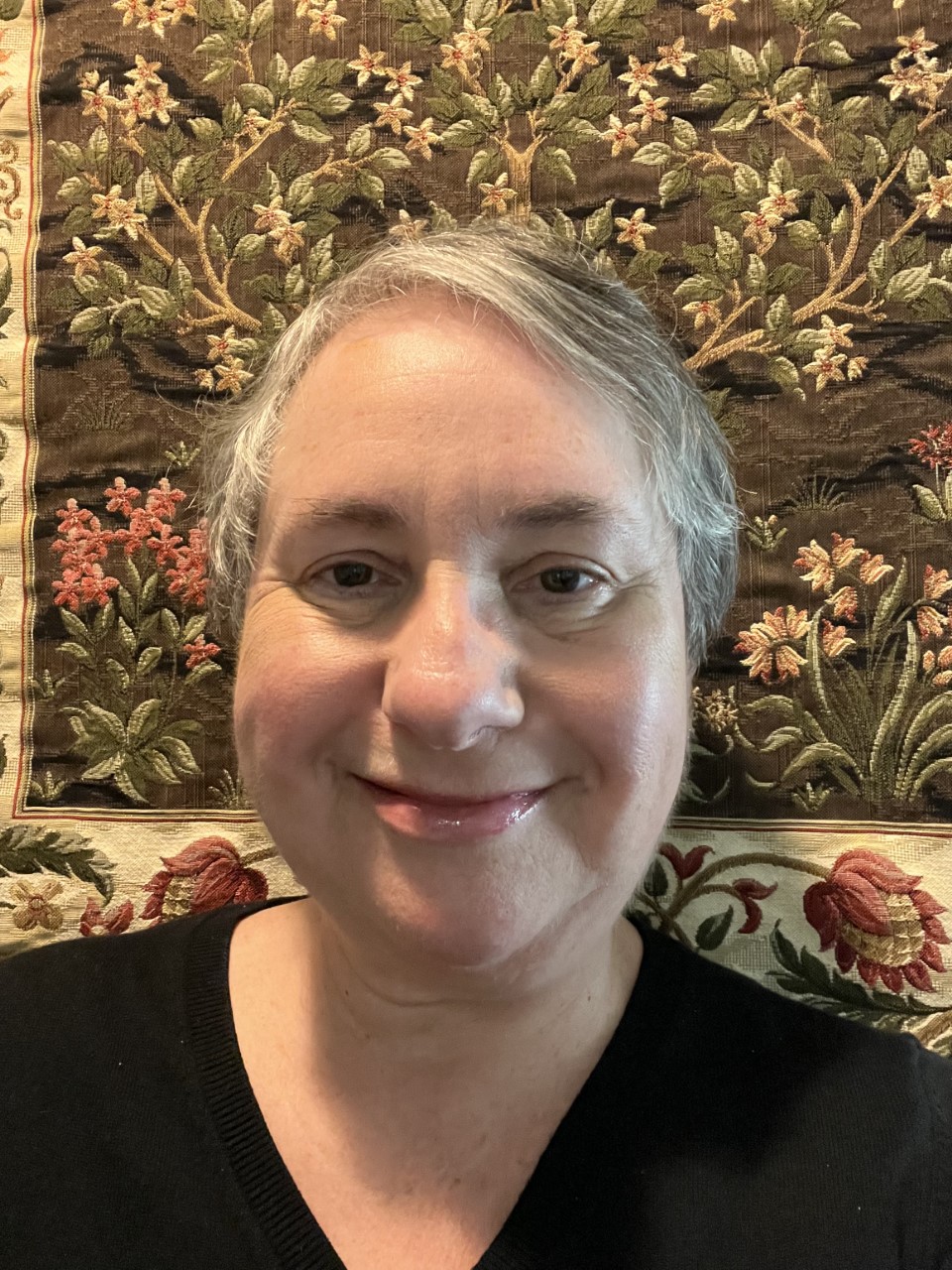
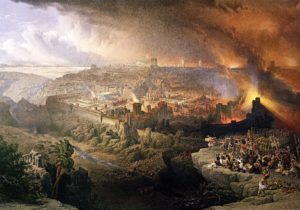
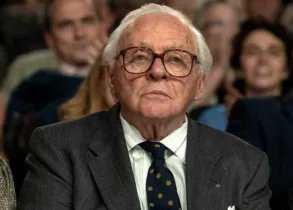
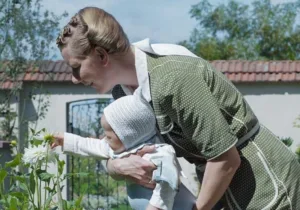
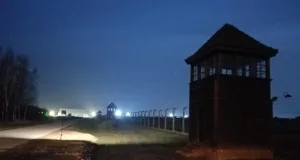
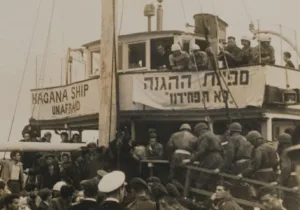

 Live in the DC area? Sign-up for Providence's in-person events list!
Live in the DC area? Sign-up for Providence's in-person events list!